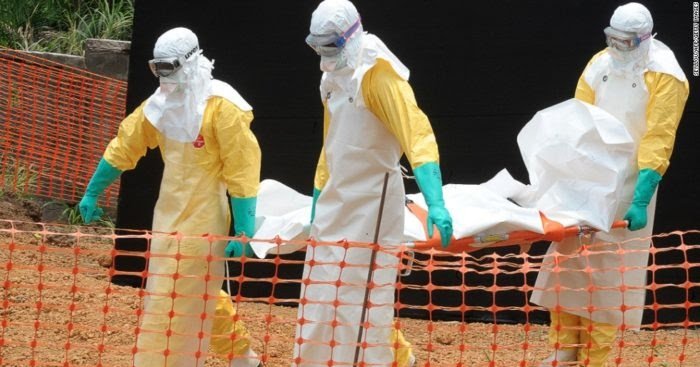Ugandan authorities on Tuesday quarantined 13 people, who picked up a corpse, suspected to have died as a result of Ebola in eastern Democratic Republic of Congo as hemorrhagic fever tests are carried out.
The Ministry of Health and World Health Organisation in a joint statement disclosed this in Kampala.
The statement said that the 13 relatives travelled to DRC’s Bunia hospital to repatriate the body of the deceased, 46-year-old male for burial in the eastern district of Tororo.
“Their details have been collected and these individuals are currently separated from the rest of the community,’’ said the joint statement.
The statement said the deceased was first admitted in Bunia hospital in November 2018 after complaining of chest pain and cough, sometimes with blood.
His condition deteriorated last week and died on Friday.
“The dead man has been living and working in the DRC for the last eight years.
He developed Ebola-like symptoms and died on Friday,” said the joint statement.
“His death certificate from the hospital indicates the cause of death to be cardiac failure and pulmonary tuberculosis.” the statement said.
The ministry of health has dispatched a burial team that will later on Tuesday conduct a safe and dignified burial, according to the statement.
The statement said there is no confirmed Ebola case present in Uganda.
“Active case search continues in all communities, health facilities and on formal and informal border crossing in all districts especially in the high-risk areas,” said the statement.
Uganda is on an Ebola alert as parts of neighbouring eastern DRC are facing an outbreak of the deadly hemorrhagic fever.
The highly contagious Ebola virus causes a range of symptoms including fever, vomiting, diarrhoea, generalised pain or malaise and in many cases internal and external bleeding, according to WHO.
Mortality rates of Ebola fever, according to the global health body, are extremely high, with the human case fatality rate ranging from 50 per cent to 89 per cent, depending on viral subtype.
(Xinhua/NAN)





















